Merchants and traders in Aberdeen
(1399-1631)
A. M. Munro searched the council registers of the royal burgh of Aberdeen, and compiled this list of burgesses admited to the borough. The entries prior to 1591 were contained in lists engrossed in the council registers at the close of the minutes for the year ending at Michaelmas, but after that date in addition to the annual lists, which are continued, there is almost always a separate minute of admission under the respective dates. The records before 1591 are not only sparser, often with no more than a name, but are also lacking for 1401-1405, 1413-1432, 1434-1435, 1518-1519, 1557 and 1562-1564 - other blanks were filled in from the guildry accounts where such existed. Guild burgesses were allowed unfettered trading rights in Aberdeen; simple burgesses could only deal in Scottish wares (so being barred from the lucrative English and Flemish imports and exports); trade burgesses were limited to their own particular trades; and the council was able ex gratia to create honourary burgesses, who were accorded the full privileges of burgesses of guild and trade, and among whom numbered members of almost every family of note in Aberdeenshire. Burgesses could thus be created by descent, by apprenticeship into a trade, or ex gratia, and in the later portions of this roll the precise circumstances are usually given, sometimes also with the name of a cautioner or surety. Burgesses, masters and cautioners are all indexed here.FAIRLY. Cost: £4.00.  | Sample scan, click to enlarge

|
Official Papers
(1639)
The State Papers Domestic cover all manner of business relating to Britain, Ireland and the colonies, conducted in the office of the Secretary of State as well as other miscellaneous records.
FAIRLY. Cost: £4.00.  | Sample scan, click to enlarge
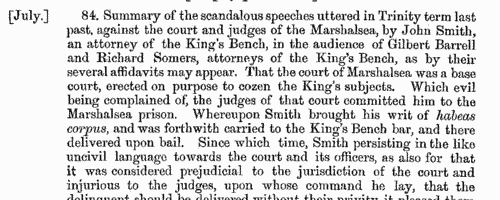
|
Official Papers
(1683-1684)
The State Papers Domestic cover all manner of business relating to Britain, Ireland and the colonies, conducted in the office of the Secretary of State as well as other miscellaneous records. This covers October 1683 to April 1684.FAIRLY. Cost: £4.00.  | Sample scan, click to enlarge
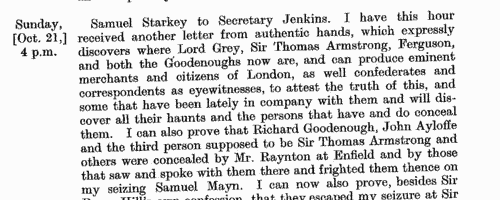
|
Treasury and Customs Records
(1685-1688)
Government accounts, with details of income and expenditure in Britain, America and the colonies
FAIRLY. Cost: £4.00.  | Sample scan, click to enlarge
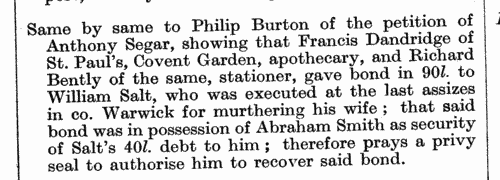
|
Official Papers
(1694-1695)
The State Papers Domestic cover all manner of business relating to Britain, Ireland and the colonies, conducted in the office of the Secretary of State as well as other miscellaneous records. Here we have the period from January 1694 to June 1695.
FAIRLY. Cost: £4.00.  | Sample scan, click to enlarge

|
Official Papers
(1697)
The State Papers Domestic cover all manner of business relating to Britain, Ireland and the colonies, conducted in the office of the Secretary of State as well as other miscellaneous records. Includes lists of passes to travel abroad.
FAIRLY. Cost: £4.00.  | Sample scan, click to enlarge
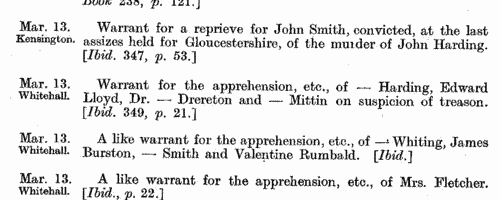
|
Treasury and Customs Officials, Officers and Pensioners
(1709)
Government accounts, with details of income and expenditure in Britain, America and the colonies
FAIRLY. Cost: £6.00.  | Sample scan, click to enlarge

|
Treasury and Customs Officials, Officers and Pensioners
(1710)
Government accounts, with details of income and expenditure in Britain, America and the colonies
FAIRLY. Cost: £6.00.  | Sample scan, click to enlarge
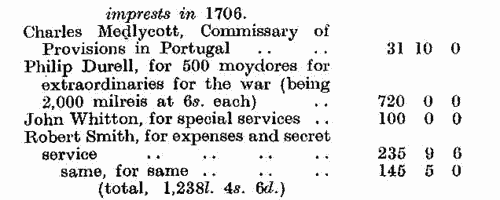
|
Treasury and Customs Officials, Officers and Pensioners
(1711)
Government accounts, with details of income and expenditure in Britain, America and the colonies
FAIRLY. Cost: £6.00.  | Sample scan, click to enlarge
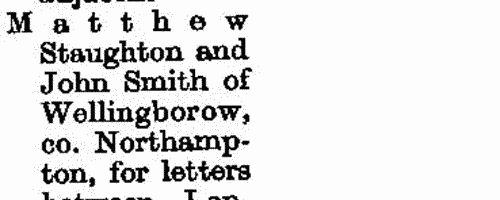
|
 Apprentices registered at Edinburgh
(1713-1715) Apprentices registered at Edinburgh
(1713-1715)
Apprenticeship indentures and clerks' articles were subject to a 6d or 12d per pound stamp duty: the registers of the payments usually give the master's trade, address, and occupation, and the apprentice's father's name and address, as well as details of the date and length of the apprenticeship. There are central registers for collections of the stamp duty in London, as well as returns from collectors in the provinces. There was a single collection for the whole of Scotland, made in Edinburgh. The sums collected are recorded in Scottish money, with conversion to sterling for transfer to London. A Scottish pund was worth 20 English pence. July 1713 to April 1715. (The sample entry shown on this scan is taken from a Norfolk return)FAIRLY. Cost: £8.00.  | Sample scan, click to enlarge

|
Research your ancestry, family history, genealogy and one-name study by direct access to original records and archives indexed by surname.













